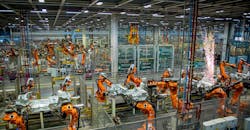No, Automation Is Not Causing a Decline in Workers’ Income
Despite a prolonged period of slow productivity growth and low unemployment, some commentators continue to voice concern over the threat automation poses to jobs. This worry continues a long tradition of fear over the consequences of machines replacing workers. But the danger is that these views could result in policies that make us worse off, such as taxing or banning robots. If the history of automation teaches us anything, it is that while automation can temporarily displace some workers, it also raises living standards for society by reducing costs, improving quality and allowing people to concentrate on higher-value work.
A recent example of concern about automation appeared in a Fortune article by Geoff Colvin. Citing work by two economists, Daron Acemoglu and Pascual Restrepo, Colvin argues that automation has been a main cause of the decline in labor’s share of national income. Allegedly, this is because over the past decade most automation has taken over tasks that workers used to do, whereas relatively little automation has created new tasks that open up opportunities for humans to do new, more productive work.
There are two problems with this argument. First, a large body of economic evidence shows that capital investment, including automation, raises national income over the medium term. Although automation can displace workers, this effect has always resulted in higher incomes, lower prices and more choices for the majority of society. There is no reason to think this time will be different. In fact, if excessive automation were happening, we should expect to see larger productivity growth and higher unemployment.
Second, Colvin and many others simply assume that since the labor share of income has gone down, automation must be the culprit. But when we look at net income instead of gross, labor’s share has remained roughly constant at around 70 percent. Moreover, the relatively small recent decline is almost entirely explained by the rise in housing costs. From 2006 to 2017, labor’s share of income fell by 0.25 percentage points, while the share going to profits was unchanged. Rental income (which includes both actual rents and the imputed rents to homeowners), however, rose by 2.4 percentage points. The rise in rent income, in turn, is due mainly to local restrictions on building more units, not automation.
In summary, automation has always delivered vast benefits to society. Even in the midst of recessions, no one proposes doing away with existing automation in order to create jobs. Just as we would not ban backhoes and mandate that workers use only shovels, we should also embrace, not resist the continued march of other forms of automation. Given the recent trend of slow productivity growth, a skills gap, low unemployment and the swell of baby boom retirement, we should focus on enriching future workers by encouraging automation.
Joe Kennedy is a senior fellow at the Information Technology and Innovation Foundation, a nonprofit think tank whose mission is to formulate, evaluate, and promote policy solutions that accelerate innovation and boost productivity to spur growth, opportunity and progress. He focuses on economic policy.
This article was originally published on the ITIF blog. It is used with permission.
About the Author
Joe Kennedy
Senior Fellow
Joe Kennedy is a senior fellow at the Information Technology and Innovation Foundation (ITIF). He focuses on economic policy.
For almost three decades, he has provided legal and economic advice to senior officials in the public and private sector. Much of this advice has been directed at public policies involving technology, competitiveness, and the social contract. He also consults privately on these issues.
Kennedy previously served as the chief economist for the U.S. Department of Commerce, where he oversaw a staff of 15 economists and regularly briefed the Secretary of Commerce on economic issues including the financial crisis and immigration reform. He has held numerous other positions in government, serving on committees in both houses of Congress and in the executive branch. As senior counsel for the Senate Permanent Subcommittee on Investigations, he helped oversee investigations of the credit counseling industry, music downloading, and the United Nations Oil for Food Program. As senior economist for the Joint Economic Committee, he authored papers on telecommunications policy and nanotechnology.
While at the Pew Charitable Trusts, he started and oversaw the Financial Reform Project, which was widely credited with bringing timely, objective information to Congress and the administration. As part of the project he helped put together and support a task force of leading financial experts co-chaired by Martin Bailey of the Brookings Institution and Peter Wallison of the American Enterprise Institute. This task force produced the only bipartisan comprehensive blueprint for reform introduced during the debates.
Dr. Kennedy spent 10 years at the Manufacturers Alliance working with senior executives from the nation’s leading manufacturing companies. He recruited and ran peer learning councils on strategic planning, technology, and supply chain logistics at which vice presidents and directors shared information about how to respond to the challenges of a dynamic, global economy. He also wrote a number of articles on subjects including government entitlements, tort reform, global warming, encryption, regulatory policy, and the future of manufacturing. He has also practiced corporate and environmental law for a large Washington, DC, firm.
Dr. Kennedy has served as the president of the board for the Arlington-Alexandria Coalition for the Homeless. He teaches a course in law, economics, and international policy at Georgetown University. He has received the Quality of Communication Award from the American Agricultural Economics Association and is the author of Ending Poverty: Changing Behavior, Guaranteeing Income, and Transforming Government (Rowman & Littlefield, 2008).
Dr. Kennedy has a law degree and a master’s degree in agricultural and applied economics from the University of Minnesota and a Ph.D. in economics from George Washington University.
